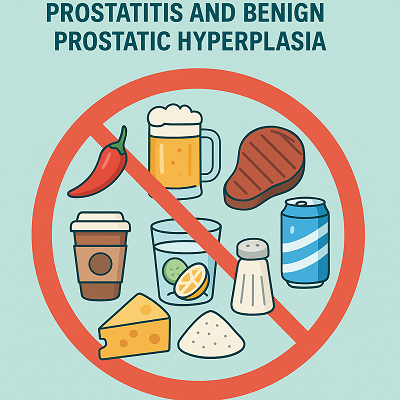Dietary Restrictions for Patients with Prostatitis and Benign Prostatic Hyperplasia (BPH): What to Avoid for Better Prostate Health
Prostatitis and benign prostatic hyperplasia (BPH) are two common prostate conditions affecting millions of men, particularly those over the age of 40. When these two conditions occur together, they can significantly worsen urinary symptoms such as frequency, urgency, weak stream, and nocturia. While medication and lifestyle adjustments are crucial parts of treatment, diet also plays a vital role in managing symptoms and preventing progression. This article outlines key dietary restrictions for men suffering from both chronic prostatitis and BPH, helping you make informed choices to support prostate health.

1. Say No to Spicy Foods and Strong Seasonings
Spicy foods such as chili peppers, wasabi, and heavily seasoned dishes can irritate the bladder and prostate, potentially triggering flare-ups of inflammation. For patients with chronic prostatitis and BPH, even small amounts may worsen urinary urgency and pelvic discomfort.
Tip: Replace spicy seasonings with mild herbs like parsley, basil, and thyme to enhance flavor without causing irritation.
2. Limit Alcohol and Caffeinated Beverages
Alcohol and caffeine are known diuretics and bladder irritants. They increase urine production and can exacerbate nocturia (frequent nighttime urination), which is already a common symptom in BPH and prostatitis patients. Moreover, alcohol can interfere with the metabolism of medications used for treatment.
Evidence: A study published in The Journal of Urology (2013) found that high caffeine intake was significantly associated with increased lower urinary tract symptoms (LUTS) in men with BPH and prostatitis.
3. Avoid Red Meat and High-Fat Animal Products
Diets high in saturated fats and red meats have been linked to inflammation and the progression of prostate enlargement. Such foods may increase the levels of certain hormones and inflammatory markers in the body, worsening both BPH and prostatitis symptoms.
Alternative: Choose lean proteins such as fish, skinless poultry, tofu, and legumes to reduce inflammation and support hormone balance.
4. Reduce Salt Intake
A high-sodium diet can raise blood pressure and potentially increase prostate volume. Excess salt may also worsen urinary symptoms by promoting fluid retention and affecting the bladder's ability to empty properly.
Practical Tip: Limit processed foods like instant noodles, deli meats, canned soups, and salty snacks. Opt for fresh, whole foods and use herbs or citrus for flavor.
5. Avoid Sugar-Sweetened and Carbonated Beverages
Sugary drinks, sodas, and artificial sweeteners may increase urinary urgency and frequency, particularly in men with sensitive bladders due to prostatitis or BPH. In some cases, carbonation may also cause bloating and discomfort in the pelvic area.
Try This: Switch to water infused with cucumber or lemon, or unsweetened herbal teas that have mild anti-inflammatory properties.
6. Moderate Dairy Consumption
High intake of dairy, especially full-fat varieties, may be associated with an increased risk of prostate issues. Some patients report that milk, cheese, and butter aggravate their symptoms.
Alternative: Choose plant-based milks like almond or oat milk, and low-fat yogurt in moderation to meet calcium needs without triggering inflammation.
7. Limit Processed Foods and Additives
Ultra-processed foods often contain additives, preservatives, and artificial ingredients that may contribute to systemic inflammation. For those with chronic prostate issues, these compounds can worsen symptoms and reduce the effectiveness of herbal or pharmaceutical treatments.
Watch Out For: Foods with long ingredient lists, artificial colors, trans fats, and flavor enhancers like monosodium glutamate (MSG).
8. Hydration: Do It Right
While staying hydrated is essential, drinking too much water in a short period—especially before bed—can aggravate nocturia. Instead, aim to drink small amounts consistently throughout the day, and reduce intake 2 hours before sleep.
Final Thoughts: Diet Is Part of a Bigger Picture
Managing prostatitis and BPH requires a holistic approach. Dietary adjustments, when combined with regular exercise, stress reduction, and appropriate medical or herbal treatments—such as the Diuretic and Anti-inflammatory Pill—can significantly improve quality of life.
Medical Insight: According to the National Institute of Diabetes and Digestive and Kidney Diseases (NIDDK), lifestyle interventions—including diet—are essential in managing BPH and reducing symptom burden. (2)
Explore Natural Relief Options
For men struggling with persistent symptoms despite conventional therapies, herbal formulations like the Diuretic and Anti-inflammatory Pill offer a complementary approach. Its multi-targeted action helps reduce inflammation, improve urination, and support long-term prostate health—without the side effects of synthetic drugs.
Conclusion
Understanding what to eat—and what to avoid—can make a real difference in managing chronic prostatitis and BPH. By eliminating common irritants and embracing anti-inflammatory, prostate-friendly foods, you empower your body to heal and function better. Be proactive, and make nutrition part of your recovery plan.



